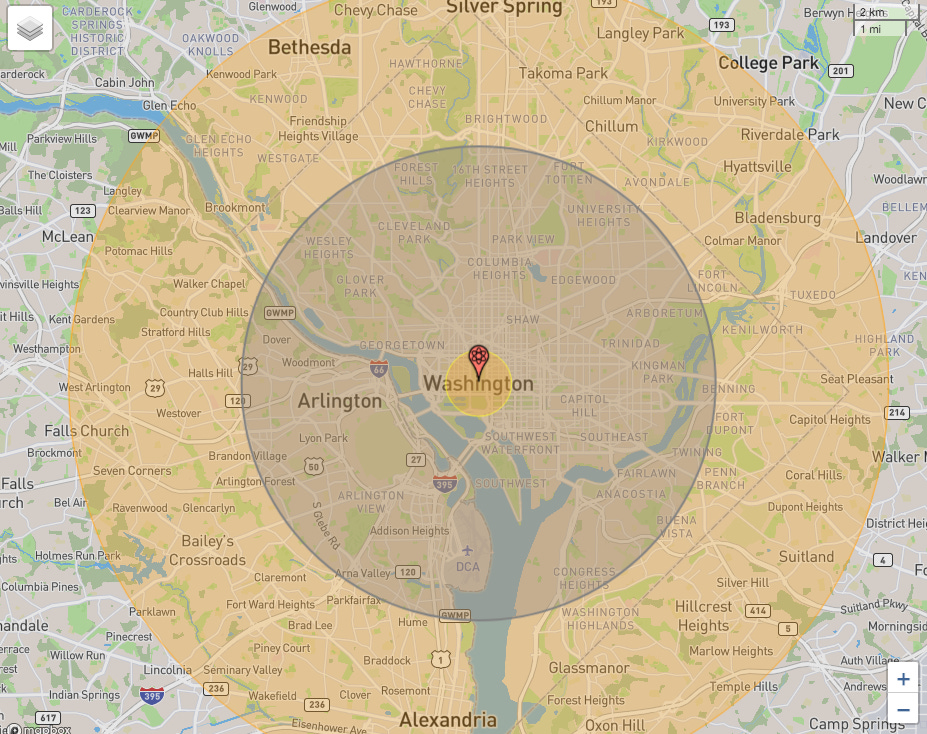NUKES: Washington D.C. Is A Very Vulnerable Target
Why are so many federal agencies all bunched up together in Washington D.C. where they could potentially all be put out of business by one nuclear weapon?
This is a question that has puzzled me for years.
QUESTION: Why have we allowed the heart of the United States federal government in Washington D.C. to be such a target rich environment?
If you dare, consider this map:
This image was provided by NukeMap, a genius invention of Alex Wellerstein. NukeMap show the impact of various kinds of nuclear weapons on any city you wish to see.
In this image we see the projected impact of a one megaton nuclear weapon targeted on the White House in Washington D.C. The map has three color coded zones showing how the detonation would affect those areas.
Center Orange Zone: In the orange circle at the very center of the display everything would be incinerated, that is, converted in to atomic particles. Zapped, over, done, completely gone.
Gray Zone: In the gray zone on map, most residential buildings collapse, injuries are universal, fatalities are widespread.
Outer Orange Zone: In the large orange circle covering most of the display people would experience third degree burns extending throughout the layers of skin, which can cause severe scarring or disablement, and can require amputation.
And, radiation would affect a much larger area than shown above, depending on wind direction, wind speeds, weather conditions etc.
Here are a couple of videos which remark on studies which have attempted to predict the damage to Washington D.C. from a 10 kiloton nuclear weapon, a size researchers used to simulate the scale of weapon a terror group might use. Please note that a 10 kiloton nuclear weapon is vastly smaller than a 1 megaton weapon, the kind of nuke an enemy nation state might use.
Federal Agencies In Washington D.C.
Here’s a list of the federal agencies in Washington that would be impacted by a nuclear weapons detonation. How impacted these agencies would be by a nuclear detonation would depend on where the agencies are located in Washington, the size and location of the detonation, weather conditions and so on.
General Services Administration
Office of Personnel Management
Department of Education
Department of Veterans Affairs
Internal Revenue Service
National Archives and Records Administration
Equal Employment Opportunity Commission
Securities and Exchange Commission
Commodity Futures Trading Commission
United States Mint
Small Business Administration
National Endowment for the Arts
Commission on Civil Rights
Administrative Office of the United States Courts
Federal Labor Relations Authority
Federal Deposit Insurance Corporation
Federal Communications Commission
Federal Emergency Management Agency
Department of Commerce
Department of Homeland Security
Office of the Comptroller of the Currency
Office of Management and Budget
International Development Finance Corporation
Natural Resources Conservation Service
Federal Bureau of Investigation
Nuclear Regulatory Commission
Office of Science and Technology Policy
Export–Import Bank of the United States
Department of State
National Labor Relations Board
Federal Mediation and Conciliation Service
Department of Justice
Department of the Interior
Environmental Protection Agency
Department of Labor
Department of Health and Human Services
Bureau of Indian Affairs
Federal Trade Commission
Federal Energy Regulatory Commission
Library of Congress
Department of the Treasury
AmeriCorps
Federal Maritime Commission
Defense Intelligence Agency
Department of Agriculture
Federal Bureau of Prisons
National Security Council
Legal Services Corporation
That’s a long list, so let’s zero in on the federal agencies which might be most important in the event of a nuclear attack on Washington. Let’s imagine the Washington headquarters of the following agencies gone, or too damaged to function.
Federal Emergency Management Agency (FEMA)
Department of Homeland Security
Federal Bureau of Investigation
Department of State
Department of Justice
Defense Intelligence Agency
And of course, these are just the federal agencies. Washington D.C. is also home to the nation’s political leadership.
The White House
The Capitol
The Supreme Court
Add to this a long list of government office buildings which house all the federal employees needed to keep the political system in Washington functional. Too many to list.
Oops, we almost forgot the Pentagon and CIA. Kinda important!
The Hawley-Blackburn Bill
Senators Hawley and Blackburn did introduce legislation which would move some federal agencies out of Washington to other areas around the country. The agencies involved included the U.S. Department of Health and Human Services, the U.S. Department of the Interior, the U.S. Department of Energy and the The Bureau of Land Management. The Trump administration wanted to move the Department of Agriculture to Kansas City.
Correct me in the comments if I’m wrong, but as best I can tell, none of these efforts succeeded. And more to the point, it appears that none of these efforts to move federal agencies out of Washington D.C. had anything at all to do with nuclear weapons.
So there you have it folks. The heart of America’s federal government is all bunched up together in one place, making it a very rich target for a nuclear attack. When was the last time you heard any of your elected officials even mention this?
Now you see it…
And then you don’t….






You probably realize that no one will lob a single nuke at Washington and call it a day. If Washington gets hit at all we are probably talking about a full exchange where at the very least a couple hundred warheads are flying.
So the main thing you are accomplishing by moving these 50 or so agencies to other cities is - besides making the administration less efficient - painting a big red cross hair on 50 or so additional cities. Under certain assumptions about enemy strategic goals and warhead count this may be worth it, but that is a nuanced discussion and not a slam dunk.
The administrative efficiency thing otoh. makes it a slam dunk. In the other direction.